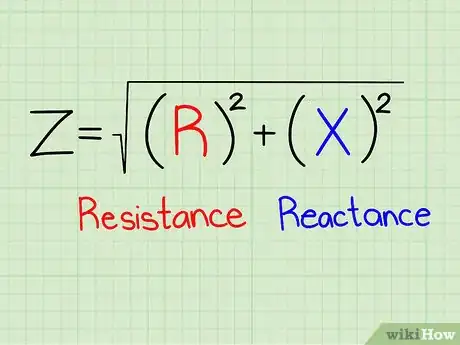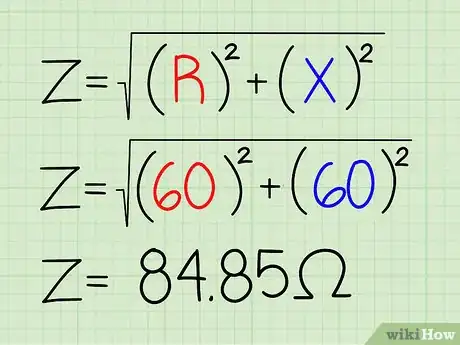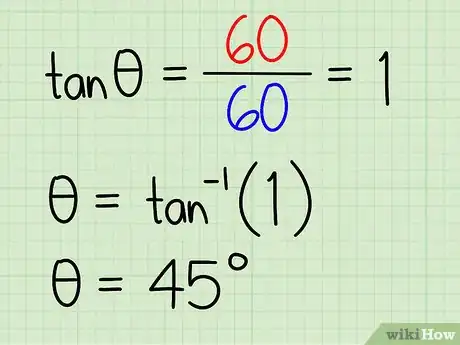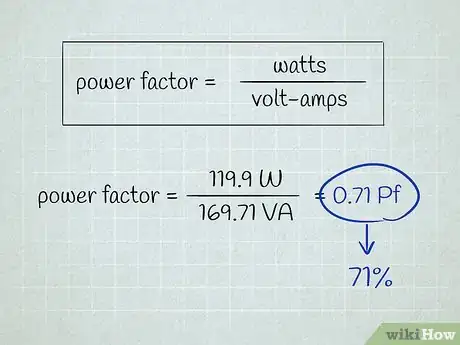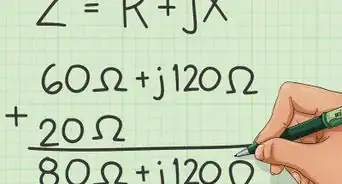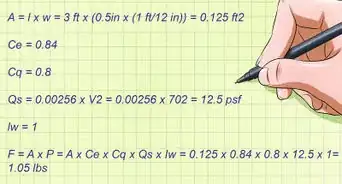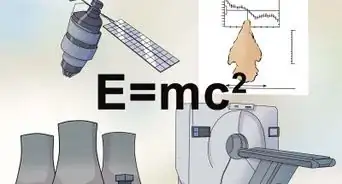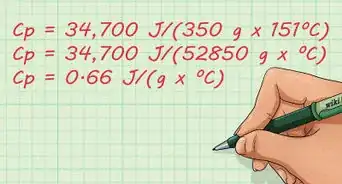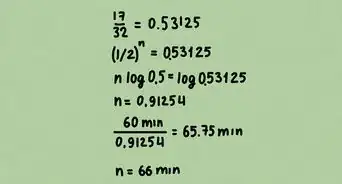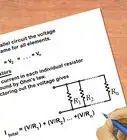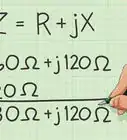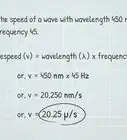wikiHow is a “wiki,” similar to Wikipedia, which means that many of our articles are co-written by multiple authors. To create this article, 27 people, some anonymous, worked to edit and improve it over time.
This article has been viewed 426,186 times.
Learn more...
Power factor correction allows you to calculate apparent power, true power, reactive power and your phase angle.[1] Consider the equation of a right triangle. So to calculate the angle you need to know your Cosine, Sine and Tangent laws. You also will need to know The Pythagorean Theorem ( c² = a² + b² ) for calculating the magnitudes of the sides of the triangle. You will also need to know what units each type of power is in. Apparent power is measured in Volt-Amps. True power is measured in Watts and your Reactive power is measured in the units called Volt-Amp-Reactive (VAR’s). There are several equations to calculate these and all will be covered in the article. You now have the basis of what you are trying to calculate.
Steps
-
1Calculate impedance. (Pretend as if impedance was in the same place as apparent power in the picture above). So to find impedance you need to use the Pythagorean Theorem c = √ (a² + b²).[2]
-
2Therefore Impedance Total (represented as “Z”) is equal to Real Power squared plus Reactive power squared and then take the square root of the answer.[3]
- ( Z = √(60² + 60²) ). So if you enter that into your scientific calculator you will receive an answer of 84.85Ω. ( Z = 84.85Ω )
Advertisement -
3Find your phase angle. So you now have your hypotenuse which is your impedance. You also have your adjacent side which is your true power and you have your opposite side which is your reactive power. So to find the angle you can use any the laws stated earlier. For example we use the Tangent Law which is the opposite side divided by the adjacent side (Reactive/True).[4]
- You should have an equation that looks like this: (60/60 = 1)
-
4Take the inverse of the tangent and acquire your Phase Angle. The inverse tangent is a button on your calculator. So you now take the inverse tangent of the equation in the previous step and this will give you your phase angle. Your equation should look something like this: tan ‾ ¹ (1) = Phase Angle. So your answer should be 45°.
-
5Calculate your total Current (Amps). Your current is in the units of amps also represented as an “A”. The formula used for calculating current is Voltage divided by Impedance which numerically looks like this: 120V/84.85Ω. You should now have an answer around 1.414A. ( 120V/84.85Ω = 1.414A )[5]
-
6You must now calculate your apparent power which is represented as “S”. To calculate apparent power you do not need to use the Pythagorean Theorem because your hypotenuse was considered your impedance. Remembering that apparent power is in the units of Volt-Amps we can calculate apparent power using the formula: Voltage squared divided by your total impedance.[6] Your equation should look like this: 120V²/84.85Ω. You should now get an answer of 169.71VA. ( 120²/84.85 = 169.71 )
-
7You must now calculate your true power which is represented as “P”.[7] To calculate true power you must have found current which you did in step number four. True power which is in the units of a Watt is calculated by multiplying your current squared (1.414²) by the resistance (60Ω) in your circuit. Your equation should look like this: 1.414² x 60 = 119.96 W.
-
8Calculate your Power Factor! To calculate your power factor you need the following information: Watts and Volt-Amps.[8] You have calculated this information in the previous steps. Your wattage is equal to 119.96W and your Volt-Amps are equal to 169.71VA. The formula for your power factor, also represented as Pf, is Watts divided by Volt-Amps. You should have an equation that looks something like this: 119.96W/169.71VA = 0.71Pf
- This can also be expressed as a percentage therefore you multiply 0.71 by 100 giving you a power factor of 71%.[9]
Community Q&A
-
QuestionWhat is the reason for calculating the power factor?
 Community AnswerThe power factor is calculated to reduce loading on the source and the physical requirements of the conductors that carry that current. By calculating the power factor, you determine how inefficient your circuit is. This gives you the information you need to make it more efficient by adding in components that will yield power factor correction.
Community AnswerThe power factor is calculated to reduce loading on the source and the physical requirements of the conductors that carry that current. By calculating the power factor, you determine how inefficient your circuit is. This gives you the information you need to make it more efficient by adding in components that will yield power factor correction. -
QuestionHow do I find out how much power my lamp needs?
 Community AnswerYou can get an ammeter and voltmeter and attach them to the lamp wires. If you don't want to do that much work, you can read the instructions in the lamp's package.
Community AnswerYou can get an ammeter and voltmeter and attach them to the lamp wires. If you don't want to do that much work, you can read the instructions in the lamp's package. -
QuestionHow can I increase a power factor?
 Community AnswerIf the circuit is inductive, by adding in a cap bank. If the circuit is capacitive, by adding in inductive loads.
Community AnswerIf the circuit is inductive, by adding in a cap bank. If the circuit is capacitive, by adding in inductive loads.
Warnings
- When calculating your impedance you use the inverse tangent function and not just the regular tangent function on your calculator. This will give you an incorrect phase angle.⧼thumbs_response⧽
- This was just a very basic example of how to calculate a phase angle and power factor. There is much more complicated circuits including capacitive power and higher resistances and reactance.⧼thumbs_response⧽
Things You'll Need
- scientific calculator
- a pencil
- eraser
- a sheet of paper
References
- ↑ https://www.allaboutcircuits.com/textbook/alternating-current/chpt-11/practical-power-factor-correction/
- ↑ https://www.electronics-tutorials.ws/accircuits/power-factor-correction.html
- ↑ https://www.electronics-tutorials.ws/accircuits/power-factor-correction.html
- ↑ https://www.allaboutcircuits.com/textbook/alternating-current/chpt-11/calculating-power-factor/
- ↑ https://iastate.pressbooks.pub/electriccircuits/chapter/power-factor-correction/
- ↑ https://www.allaboutcircuits.com/textbook/alternating-current/chpt-11/true-reactive-and-apparent-power/
- ↑ https://iastate.pressbooks.pub/electriccircuits/chapter/power-factor-correction/
- ↑ https://www.allaboutcircuits.com/textbook/alternating-current/chpt-11/calculating-power-factor/
- ↑ https://www.electronics-tutorials.ws/accircuits/power-triangle.html
About This Article
To calculate Power Factor correction, first use the Pythagorean Theorem to find the Impedance from the Real Power and the Reactive Power. The Impedance is the hypotenuse of the triangle, the adjacent side is the True Power, and the opposite side is the Reactive Power. Use a formula like the Tangent Law to find the Phase Angle, then calculate the total Current in Amps by dividing the Voltage by the Impedance. Calculate the apparent power, or Voltage Squared divided by Impedance, as well as True Power, by multiplying Current squared by the resistance in your circuit. The Power Factor is Watts divided by Volt-Amps. Keep reading to see examples of these calculations!
